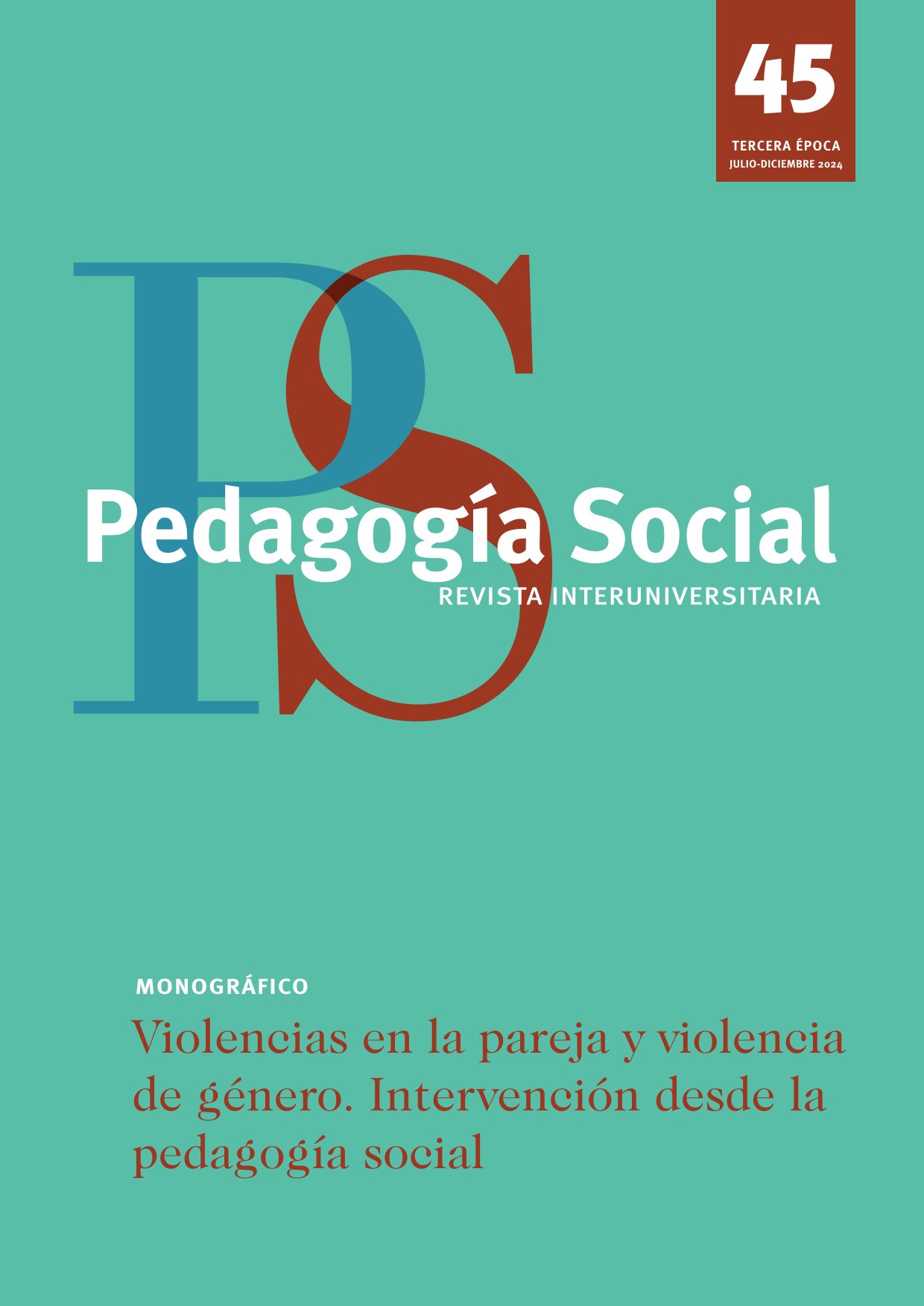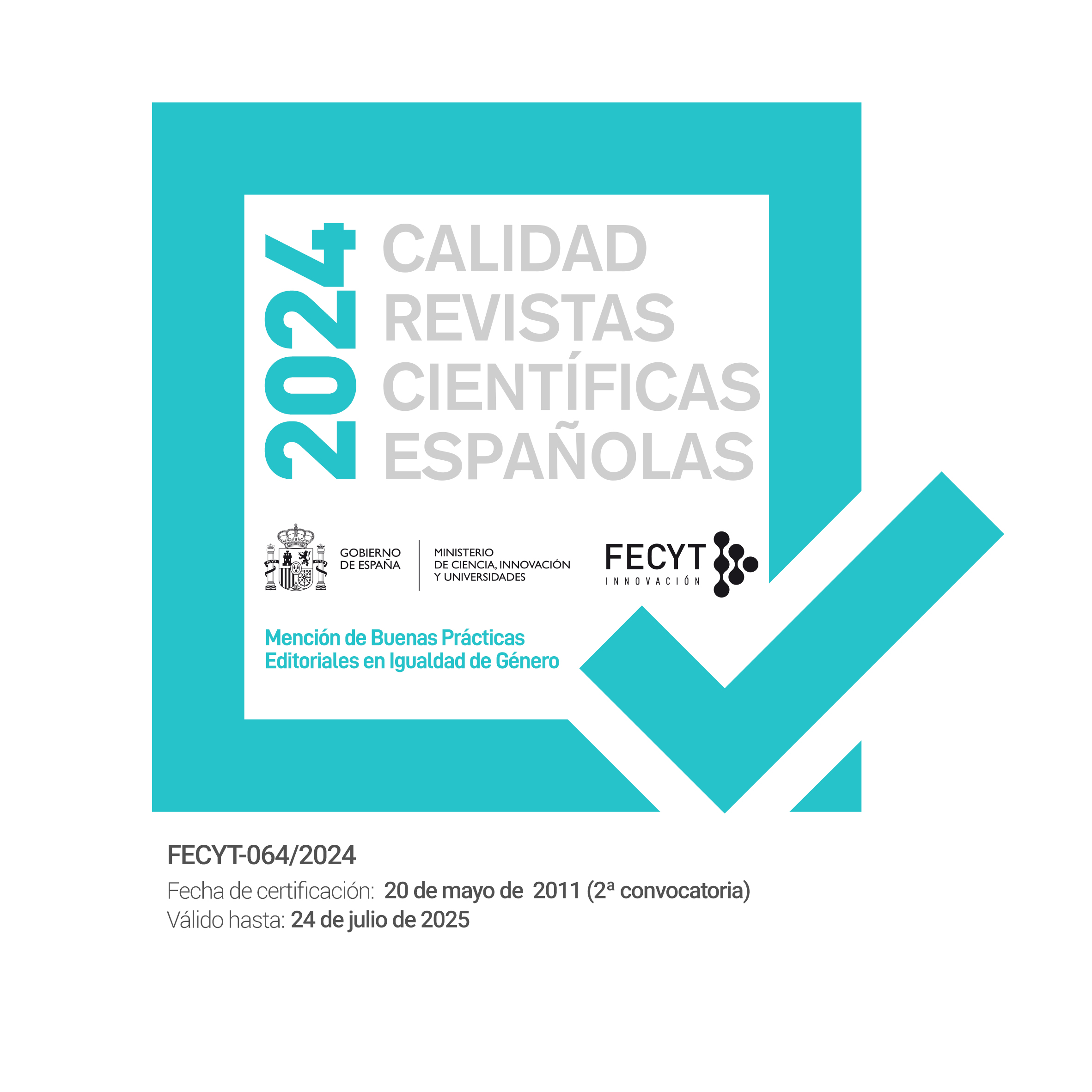Myths of romantic love and ambivalent sexism in adolescents
DOI:
https://doi.org/10.7179/PSRI_2024.45.07Keywords:
Adolescence, love, sexism, sex educationAbstract
The aim of this work was to analyze the prevalence of sexism and myths of romantic love among adolescents, as well as the relationship between both variables and their stability depending on age. 900 adolescents from public schools, of which 53.4 % were girls, between 13 and 17 years old, with an average of 15.2, completed the Ambivalent Sexism Inventory and the Love Myths Scale. The main results indicated that the scores differ between boys and girls, especially in the case of sexism, a variable in which the boys’ scores were much higher than that of the girls. In relation to myths of romantic love, girls scored higher in myths related to the idealization of love, and boys in those that link love and abuse. Gender differences were found in the relationship between both variables and with age, although the prevalence does not vary much over time. It was concluded that factors such as pornography consumption, the proliferation of denialist ideas of gender violence and the absence of adequate affective-sexual education could be behind these results. It seems necessary to implement actions, from all areas, to ensure that adolescents internalize egalitarian values.
Downloads
References
Boneta-Sádaba, N., García-Mingo, E. y Tomás-Forte, S. (2024). Entendiendo el negacionismo de la violencia de género: Discursos sobre violencia de género entre adolescentes españoles/as. Revista Prisma Social, 44, 359–370.
Bonilla-Algovia, E., Rivas-Rivero, E. y Pascual Gómez, I. (2021). Mitos del amor romántico en adolescentes: relación con el sexismo y variables procedentes de la socialización. Educación XX1, 24(2), 441-464. https://doi.org/10.5944/educXX1.28514
Camacho, J. (1995). Análisis multivariado con SPSS. Editorial Universidad de Barcelona.
Carrascosa, L., Cava, M. J., Buelga, S. y De Jesús, S. N. (2019). Reduction of sexist attitudes, romantic myths, and aggressive behaviors in adolescents. Efficacy of the DARSI program. Psicothema, 31(2), 121-127. http://dx.doi.org/10.7334/psicothema2018.245
Cava, M. J., Castillo, I., Buelga, S. y Tomás., I. (2023). Relationships Among Romantic Myths, Tolerant Attitudes Toward Abuse, and Teen Dating Violence Victimization: The Moderator Role of Gender. Youth and Society, 55(8), 1542-1567. https://doi.org/10.1177/0044118X221119235
Cava, M. J., Martínez-Ferrer, B., Buelga, S. y Carrascosa, L. (2020). Sexist attitudes, romantic myths, and offline dating violence as predictors of cyber dating violence perpetration in adolescents. Computers in Human Behavior, 111, 106449. https://doi.org/10.1016/j.chb.2020.106449
Cerro, M. y Vives, M. (2019). Prevalencia de los mitos del amor romántico en jóvenes. OBETS. Revista de Ciencias Sociales, 14(2), 343-371. https://doi.org/10.14198/OBERS2019.14.2.03
Ciarrochi, J., Parker, P. D., Sahdra, B. K., Kashdan, T. B., Kiuru, N. y Conigrave, J. (2017). When empathy matters: The role of sex and empathy in close friendship. Journal of Personality, 85(4), 494-504. https://doi.org/10.1111/jopy.12255
Cinquegrana, V., Marini, M. y Galdi, S. (2023). Psychological abuse is not a problem! Exploring the role of domestic violence myths in psychological revictimization. Frontiers in Psychology, 14, 1228822. https://doi.org/10.3389/fpsyg.2023.1228822
Cislaghi, B. y Heise, L. (2019). Using social norms theory for health promotion in low-income countries. Health Promotion International, 34(3), 616-623. http://dx.doi.org/10.1093/heapro/day017
Delegación del Gobierno contra la Violencia de Género (2020). Macroencuesta de violencia contra la mujer 2019. Ministerio de Igualdad.
de Lemus, S., Castillo, M., Moya, M., Padilla, J. L. y Ryan, E. (2008). Elaboración y validación del Inventario de Sexismo Ambivalente para adolescentes. International Journal of Clinical and Health Psychology, 8(2), 537-562. http://www.redalyc.org/articulo.oa?id=33712001013
Galván, M., Briceño, C., Fernández, M. C. y Mora, G. (2021). Inventario de Sexismo Ambivalente (ISA) en adolescentes chilenos: estructura factorial, fiabilidad, validez e invarianza por sexo. Revista de Psicología Clínica con Niños y Adolescentes, 8(3), 9-17. https://doi.org/10.21134/rpcna.2021.08.3.1
Glick, P. y Fiske, S. T. (1996). The Ambivalent Sexism Inventory: Differentiating hostile and benevolent sexism. Journal of Personality and Social Psychology, 70(3), 491–512. https://doi.org/10.1037/0022-3514.70.3.491
Goh, J. X. y Tignor, S. M. (2020). Interpersonal dominance-warmth dimensions of hostile and benevolent sexism: Insights from the self and friends. Personality and Individual Differences, 155(1), 109753. https://doi.org/10.1016/j.paid.2019.109753
Haggard, M.C., Kaelen, R., Saroglou, V., Klein, O. y Rowatt, W.C. (2019). Religion’s Role in the Illusion of Gender Equality: Supraliminal and Subliminal Religious Priming Increases Benevolent Sexism. Psychology of Religion and Spirituality, 11(4), 392-398. https://doi.org/10.1037/rel0000196
Hammond, M. D. y Sibley, C. G. (2011). Why are benevolent sexists happier? Sex Roles, 65, 332-343. https://doi.org/10.1007/s111990-011-0017-2
Heise, L. L. y Kotsadam, A. (2015). Cross-national and multilevel correlates of partner violence: an analysis of data from population-based surveys. Lancet Global Health, 3, 332-340. https://doi.org/10.1016/S2214-109X(15)00013-3
Hellmer, K., Stenson, J. T. y Jylhä, K. M. (2018). What’s (not) underpinning ambivalent sexism? Revisiting the roles of ideology, religiosity, personality, demographics, and men’s facial hair in explaining hostile and benevolent sexism. Personality and Individual Differences, 122, 29-37. https://doi.org/10.1016/j.paid.2017.10.001
Jiménez-Picón, N., Romero-Martín, M., Romero-Castillo, R., Palomo-Lara. J. C. y Alonso-Ruíz, M. (2023). Internalization of the Romantic Love Myths as a Risk Factor for Gender Violence: A Systematic Review and Meta‑Analysis. Sexuality Research and Social Policy, 20, 837-854. https://doi.org/10.1007/s13178-022-00747-2
León, C. M. y Aizpurúa, E. (2020). ¿Persisten las actitudes sexistas en los estudiantes universitarios? Un análisis de su prevalencia, predictores y diferencias de género. Educación XX1, 23(1), 275-296. https://doi.org/10.5944/educxx1.23629
López-Martín, E. y Ardura, D. (2023). El tamaño del efecto en la publicación científica. Educación XX1, 26(1), 9-17. https://doi.org/10.5944/educxx1.36276
Malonda, E., Tur-Porcar, A. y Llorca, A. (2017). Sexismo en la adolescencia: estilos de crianza, división de tareas domésticas, conducta prosocial y agresividad. Revista de Psicología Social, 32(2), 333-361. https://doi.org/10.1080/02134748.2017.1291745
Marcos, V., Cea, B., Novo, M. y Seijo, D. (2023). Contrasting cognitive competence of victimized youngsters in dating relations. Revista Iberoamericana de Psicología y Salud, 14(2), 68-74. https://doi.org/10.23923/j.rips.2023.02.06
Marques-Fagundes, A. L., Megías, J. L., García-García, D. M. y Petkanopoulou, K. (2015). Ambivalent sexism and egalitarian ideology in perception of psychology abuse and (in)vulnerability to violence. Revista de Psicología Social, 30(1), 31-59. https://doi.org/10.1080/02134748.2014.991519
Martín, E., Torbay, A. y Guerra-Hernández, C. (2021). Gender segregation in peer relationships and its association with peer reputation. Psicothema, 33(2), 244-250. https://doi.org/10.7334/psicothema2020.359
Mastari, L., Spruyt, B. y Siongers, J. (2019). Benevolent and hostile sexism in social spheres: the impact of parents, school and romance on Belgian adolescents’ sexist attitudes. Frontiers in Sociology, 4, 47. https://doi.org/doi.org/10.3389/fsoc.2019.00047
Mehta, C. M. y Stough, J. (2009). Sex segregation in friendship and normative contexts across the life span. Developmental Review, 29, 201-220. https://doi.org/10.1016/j.dr.2009.06.001
Mikołajczak, M. y Pietrzak, J. (2014). Ambivalent sexism and religion: Connected through values. Sex Roles, 70, 387-399. https://doi.org/10.1007/s11199-014-0379-3
Peter, J. y Valkenburg, P. M. (2016). Adolescents and pornography: A review of 20 years of research. Journal of Sex Research, 53(4-5), 509-531. https://doi.org/10.1080/00224499.2016.1143441
Preacher, K. J. (2002). Calculation for the test of the difference between two independent correlation coefficients Computer software]. Available from http://quantpsy.org.
Rivas-Rivero, E., Checa-Romero, M. y Viuda-Serrano, A. (2022). Factores relacionados con las creencias distorsionadas sobre las mujeres y la violencia en estudiantes de Educación Secundaria. Revista de Educación, 395, 363-389. http://dx.doi.org/10.4438/1988-592X-RE-2022-395-517
Rodríguez, E., Kuric, S., Sanmartín, A. y Gómez, A. (2023). Barómetro Juventud y Género 2023. Avance de resultados: violencia de género. Centro Reina Sofía de Fad Juventud. http://dx.doi.org/10.5281/zenodo.10144139
Rodríguez-Castro, Y., Lameiras-Fernández, M., Carrera-Fernández, M. V. y Vallejo-Medina, P. (2013). La fiabilidad y validez de la escala de mitos hacia el amor: las creencias de los y las adolescentes. Revista de Psicología Social, 28(2), 157-168. http://dx.doi.org/10.1174/021347413806196708.
Ruiz-Palomino, E., Ballester-Arnal, R., Giménez-García, C. y Gil-Llario, M. D. (2021). Influence of beliefs about romantic love on the justification of abusive behaviors among early adolescents. Journal of Adolescence, 92, 126-136. http://dx.doi.org/10.1016/j.adolescence.2021.09.001
Save the Children (2021). No es amor. Un análisis sobre la violencia de género entre adolescentes. Save the Children España.
Sedano, S., Lorente de Sanz, J., Ballester, L. y Aznar, B. (2024). Acceso, consumo y consecuencias del consumo de pornografía entre adolescentes: nuevos retos para la educación afectivo-sexual. Pedagogía Social. Revista Interuniversitaria, 44, 161-175. http://doi.org/10.7179/PSRI_2024.44.09
Tomaszewska, P. y Schuster, I. (2021). Prevalence of teen dating violence in Europe: a systematic review of studies since 2010. Child and Adolescent Development, 178, 11-37. https://doi.org/10.1002/cad.20437
Vinagre-González, A. M., Puente-López, E., Aguilar-Cárceles, M. M., Aparicio-García, M. E. y Loinaz, I. (2023). Differences between men and women in the acceptance of gender roles and stereotypes in intimate partner violence. Revista Iberoamericana de Psicología y Salud, 14(2), 75-82. https://doi.org/10.23923/j.rips.2023.02.068
Wright, P.J., Tokunaga, R.S. y Kraus, A. (2016). A meta-analysis of pornography consumption and actual acts of sexual aggression in general population studies. Journal of Communication, 66(1), 183-205. https://doi.org/10.1111/jcom.12201
Published
How to Cite
Issue
Section
License

This work is licensed under a Creative Commons Attribution-NonCommercial-ShareAlike 4.0 International License.
Copyright and right to archive
The published version of the articles can be self-archived by their authors in open access institutional and thematic repositories. However, Pedagogía Social. Revista Interuniversitaria must authorize partial or global reutilisation on new papers or publications.
Published papers must be cited including the title of the journal Pedagogía Social. Revista Interuniversitaria, issue, pages and year of publication
Ethical responsibilities
Pedagogía Social. Revista Interuniversitaria does not accept any material that has been previously published in other documents or publications. Authors are responsible for obtaining the required permissions for partial or global reproduction any material from other publications, and to correctly quote its origin.
Pedagogía Social. Revista Interuniversitaria is obliged to detect and report fraudulent practices.
Only those who have intellectually contribute to the development of the paper must appear as authors.
The journal expects authors to declare any commercial partnership that might entail a conflict of interest with respect to the submitted article.
Authors must mention in the article, preferably in the “methodology” section, that the procedures used during the samplings and controls have been made after getting informed consent.
The journal will not use any received contribution in a way other than the goals described in these guidelines.
Copyright Notice
© Pedagogía Social. Revista Interuniversitaria. Papers published in both the printed and online versions of this Journal are property of Pedagogia Social. Revista Interuniversitaria, being required to cite the source in any partial or total reproduction.
Unless otherwise stated, all content of this electronic journal is distributed under "Creative Commons Attribution-Non commercial 3.0 Spain" (CC-by-nc) license for use and distribution. The informative version and the legal text of this license is available here. This has to be expressly stated in this way when necessary.






